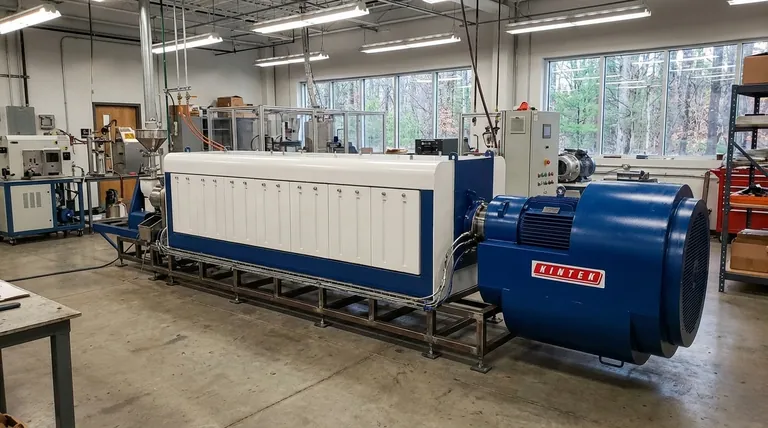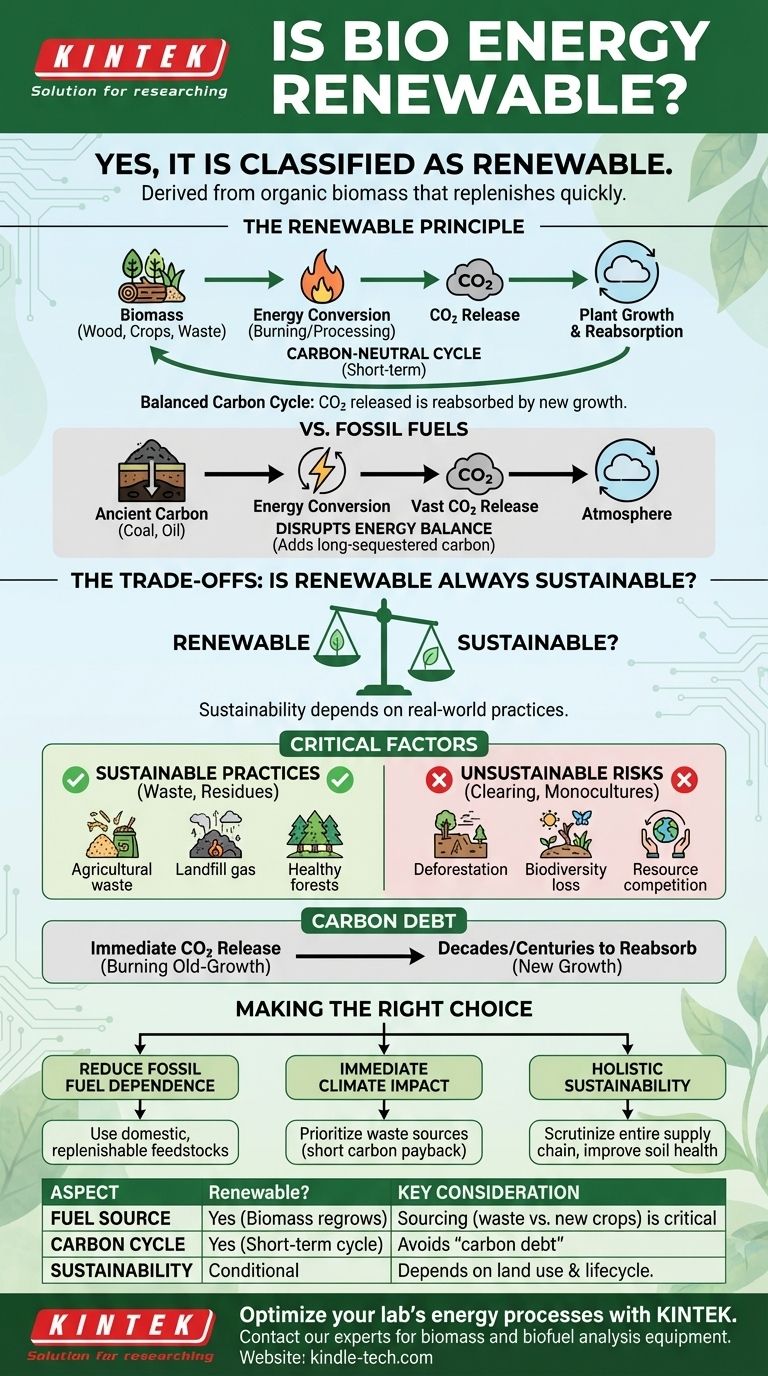Yes, bioenergy is classified as a renewable energy source. It is derived from organic material known as biomass—such as wood, crops, and agricultural waste—which can be replenished far more quickly than the geological timescales required for the formation of fossil fuels. The core principle is that the carbon dioxide released when biomass is converted to energy is part of a short-term biological cycle, rather than the release of ancient, sequestered carbon.
Bioenergy's status as renewable comes from its fuel source, biomass, which can be regrown. However, its true sustainability and environmental impact are not guaranteed; they depend entirely on how that biomass is sourced, managed, and converted.

What Makes Bioenergy Renewable?
The classification of bioenergy as "renewable" is rooted in the unique characteristics of its fuel source and its role within the planet's natural carbon cycle.
The Fuel Source: Biomass
Biomass is simply organic matter that can be used as an energy source. This is a broad category that includes a variety of materials.
Common sources include wood and forestry residues, dedicated energy crops like switchgrass, agricultural waste from farming, and even algae. These materials all store chemical energy originally captured from the sun through photosynthesis.
The Balanced Carbon Cycle
The key to understanding bioenergy's renewable status is the carbon cycle. When plants grow, they absorb carbon dioxide (CO2) from the atmosphere.
When that biomass is burned or converted to energy, it releases that same CO2 back into the atmosphere. Because this CO2 can be reabsorbed by new plant growth, the process is considered carbon-neutral within a closed loop.
A Contrast with Fossil Fuels
This stands in stark contrast to fossil fuels like coal, oil, and natural gas. When we burn fossil fuels, we are releasing vast amounts of carbon that were removed from the atmosphere and stored underground millions of years ago.
This adds new, long-sequestered carbon into the current atmosphere, disrupting the planet's energy balance. Bioenergy, in principle, operates within the existing, active carbon cycle.
Understanding the Trade-offs: Is "Renewable" Always "Sustainable"?
While technically renewable, the sustainability of bioenergy is a subject of significant debate and depends heavily on real-world practices. The label "renewable" does not automatically mean it is environmentally beneficial.
The Critical Role of Feedstock Sourcing
The single most important factor is where the biomass comes from. Using agricultural residues, municipal solid waste, or waste from forest management can be highly sustainable.
However, if sourcing biomass leads to the clearing of old-growth forests or converting natural land to grow energy crops, it can have severe negative consequences for biodiversity, water resources, and soil health.
The Question of "Carbon Debt"
There is a critical time lag to consider. If a 100-year-old forest is cut down for bioenergy, it creates a "carbon debt." The large, immediate release of CO2 will take decades or even centuries for a new, replanted forest to reabsorb.
During this period, the net effect is an increase in atmospheric CO2, similar to burning fossil fuels. This time lag is a major challenge to the "carbon-neutral" claim in many scenarios.
Competition for Land and Resources
Growing dedicated energy crops on a massive scale can create competition with food production, potentially driving up food prices and creating food insecurity. It also demands significant land, water, and fertilizer resources, which have their own environmental footprints.
Making the Right Choice for Your Goal
Evaluating bioenergy requires looking beyond the "renewable" label to its specific application and feedstock.
- If your primary focus is reducing fossil fuel dependence: Bioenergy is a viable, dispatchable alternative that can use replenishable domestic feedstocks to generate reliable power.
- If your primary focus is immediate climate impact: Prioritize bioenergy from waste sources (like agricultural residue, landfill gas, or forestry waste) that have a very short carbon payback period.
- If your primary focus is holistic sustainability: Scrutinize the entire supply chain. The best bioenergy practices are those that use waste materials or are integrated into agricultural systems in a way that improves soil health and avoids competition with food.
Ultimately, the sustainability of bioenergy is determined not by its definition, but by the thoughtful and responsible management of its entire lifecycle.
Summary Table:
| Aspect | Renewable? | Key Consideration |
|---|---|---|
| Fuel Source | Yes (Biomass regrows) | Sourcing (waste vs. new crops) is critical |
| Carbon Cycle | Yes (Short-term cycle) | Avoids 'carbon debt' from old-growth harvesting |
| Sustainability | Conditional | Depends on land use and lifecycle management |
Optimize your lab's energy and material processes with KINTEK.
As you evaluate sustainable energy sources like bioenergy, the right lab equipment is crucial for accurate analysis of biomass, biofuels, and their environmental impact. KINTEK specializes in precise, reliable lab equipment and consumables that help researchers and industries make informed, sustainable decisions.
Whether you're developing new biofuels, analyzing feedstock, or monitoring emissions, our products support the entire lifecycle of your bioenergy research.
Contact our experts today to find the perfect equipment for your sustainable energy projects.
Visual Guide

Related Products
- Electric Rotary Kiln Small Rotary Furnace Biomass Pyrolysis Plant
- Hybrid High Energy Vibratory Ball Mill for Lab Use
- High Energy Planetary Ball Mill Milling Machine for Laboratory
- High Energy Vibratory Ball Mill for Lab Use
- Electric Rotary Kiln Continuous Working Small Rotary Furnace Heating Pyrolysis Plant
People Also Ask
- Why is a precision drying oven required for TiO2 wet gel? Ensure Structural Integrity & Porosity
- How do you check a diamond CVD? Verify Your Lab-Grown Diamond with Confidence
- What is the sintering process of coating? Building Durable, Solid Layers from Powder
- Why are conventional preservation methods less suitable for biological products? The Critical Risk to Efficacy and Safety
- What is the product of slow pyrolysis? Tailor-Made Biochar, Oil, and Syngas from Biomass
- What role does an orbital shaker incubator play in uranium bioleaching? Optimize Fungal Acid Secretion with Precision
- Why is a static laboratory testing system necessary? Analyze Refractory Degradation for Copper Smelting
- What is sputter coating? A High-Performance Thin Film Deposition Process







